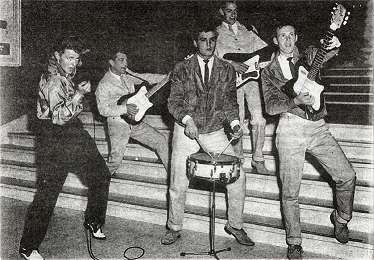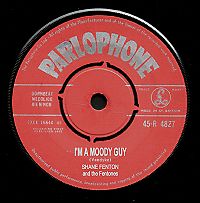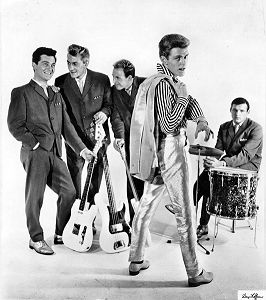 |
 |
 The band,
whose line-up had long settled of Jerry Wilcock and Mick Eyre on lead and rhythm guitars,
Bill Bonney on bass and Tony Hinchcliffe on drums were understandably
gutted and ready to quit, but
with some persuasion from Johnny's Mother they steeled their resolve and coerced Bernard into full-time singing by
taking over the Shane Fenton role. They attended the BBC and passed the audition with flying colours,
on offer was a slot on the two-hour "Saturday Club", a show recorded in
Birmingham to be
transmitted nationally. Their spot on the show went so well they became regular guests on the
series and the programme's musical director, Tommy Sanderson became their
manager. He secured the group a long-term recording contract with EMI's Parlophone
label, sometimes seen as the eccentric relation to its associate labels, Columbia (Cliff Richard,
the Shadows) and HMV (early Elvis, Johnny Kidd and the
Pirates). True, George
Martin's roster consisted of more unusual signings on the company like established comedy acts,
like Bernard Cribbins, Charlie
Drake and Peter Sellers, although Martin would turn this to advantage by turning
output into hits, sometimes unexpectedly so. The label's biggest current
draw and
consistent seller was teen idol Adam Faith, and even his gimmick of emulating
Buddy Holly's hiccupping approach to deliver the lyrics wasn't too far
away from the labels' reputation within EMI. The bulk of the groups' production
work was handled by George Martin (the man behind the Beatles' hits), only
occasionally
handing over to others. The band,
whose line-up had long settled of Jerry Wilcock and Mick Eyre on lead and rhythm guitars,
Bill Bonney on bass and Tony Hinchcliffe on drums were understandably
gutted and ready to quit, but
with some persuasion from Johnny's Mother they steeled their resolve and coerced Bernard into full-time singing by
taking over the Shane Fenton role. They attended the BBC and passed the audition with flying colours,
on offer was a slot on the two-hour "Saturday Club", a show recorded in
Birmingham to be
transmitted nationally. Their spot on the show went so well they became regular guests on the
series and the programme's musical director, Tommy Sanderson became their
manager. He secured the group a long-term recording contract with EMI's Parlophone
label, sometimes seen as the eccentric relation to its associate labels, Columbia (Cliff Richard,
the Shadows) and HMV (early Elvis, Johnny Kidd and the
Pirates). True, George
Martin's roster consisted of more unusual signings on the company like established comedy acts,
like Bernard Cribbins, Charlie
Drake and Peter Sellers, although Martin would turn this to advantage by turning
output into hits, sometimes unexpectedly so. The label's biggest current
draw and
consistent seller was teen idol Adam Faith, and even his gimmick of emulating
Buddy Holly's hiccupping approach to deliver the lyrics wasn't too far
away from the labels' reputation within EMI. The bulk of the groups' production
work was handled by George Martin (the man behind the Beatles' hits), only
occasionally
handing over to others.
 A breezy rendition of the
George Formby novelty number "Five Foot Two, Eyes Of
Blue" was originally slated for the first single but a new number was
eventually commissioned for the topside from fellow Parlophone artist Jerry Lordan. He
had
already been responsible for a string of hits including "With A Girl
Like You" for Cliff Richard, also the Shadow's
"Apache"; he would go on to pen many others,
including "Diamonds" and "Scarlett O'Hara", top five smashes
for Jet Harris and Tony Meehan in 1963. Sharing the same Manager, Tommy
Sanderson, Lordan and Fenton met each other in the offices of music
publisher Francis, Day and Hunter. Fenton's natural shyness and laid back demeanour inspired Lordan
to custom write "I'm A
Moody Guy" (click here to play an extract)
which contains his distinctive trademarks; a
shifting chord sequence line with unexpected extra beats and notes (a style
mastered by Burt Bacharach), plus a catchy melody pleasantly sung by Shane with a
few Holly-esque hiccoughs here and there for good measure. The finished song was
delivered within 48 hours to George Martin who gave it
his usual attention to clean production, Tommy Sanderson tinkled the ivories and Lordan himself is in there on his electric ukulele.
The single was released at the end of September and the band introduced
to the media mat London's Centre Of Sound. This minor classic entered the charts a month after
issue, and went on to make no. 21 in a eight-week run and has become one of the
better-remembered pre-Beat era British pop songs despite not quite
breaking the Top Twenty. In November, the "New
Musical Express" contained a feature on Parlophone's new recording
star. A breezy rendition of the
George Formby novelty number "Five Foot Two, Eyes Of
Blue" was originally slated for the first single but a new number was
eventually commissioned for the topside from fellow Parlophone artist Jerry Lordan. He
had
already been responsible for a string of hits including "With A Girl
Like You" for Cliff Richard, also the Shadow's
"Apache"; he would go on to pen many others,
including "Diamonds" and "Scarlett O'Hara", top five smashes
for Jet Harris and Tony Meehan in 1963. Sharing the same Manager, Tommy
Sanderson, Lordan and Fenton met each other in the offices of music
publisher Francis, Day and Hunter. Fenton's natural shyness and laid back demeanour inspired Lordan
to custom write "I'm A
Moody Guy" (click here to play an extract)
which contains his distinctive trademarks; a
shifting chord sequence line with unexpected extra beats and notes (a style
mastered by Burt Bacharach), plus a catchy melody pleasantly sung by Shane with a
few Holly-esque hiccoughs here and there for good measure. The finished song was
delivered within 48 hours to George Martin who gave it
his usual attention to clean production, Tommy Sanderson tinkled the ivories and Lordan himself is in there on his electric ukulele.
The single was released at the end of September and the band introduced
to the media mat London's Centre Of Sound. This minor classic entered the charts a month after
issue, and went on to make no. 21 in a eight-week run and has become one of the
better-remembered pre-Beat era British pop songs despite not quite
breaking the Top Twenty. In November, the "New
Musical Express" contained a feature on Parlophone's new recording
star.
 The
group's live appearances featuring a solid stage set quickly gained the
group a good reputation. Onstage, they cut fine figures; Fenton sporting a distinctive silver lame suit
and backed by the smartly playing Fentones in matching pink suits, resplendent
with their corresponding white Fender guitars. Shane Fenton quickly became part of Britain's' pre-Beat enclave beside other
home-grown talent including Cliff
Richard, Marty Wilde, Duffy Power and Billy Fury. During the next four years, he
and his Fentones regularly headlined pop-package concert tours alongside some of
these big stars, and also starred on legendary television shows like "Thank
Your Lucky Stars". The bands' debut on this show took place on
Saturday 6th October, Keith Fordyce and Brian Matthew presented an
star line-up including Cliff Richard, the Shadows, Karl Denver and Helen
Shapiro. The
group's live appearances featuring a solid stage set quickly gained the
group a good reputation. Onstage, they cut fine figures; Fenton sporting a distinctive silver lame suit
and backed by the smartly playing Fentones in matching pink suits, resplendent
with their corresponding white Fender guitars. Shane Fenton quickly became part of Britain's' pre-Beat enclave beside other
home-grown talent including Cliff
Richard, Marty Wilde, Duffy Power and Billy Fury. During the next four years, he
and his Fentones regularly headlined pop-package concert tours alongside some of
these big stars, and also starred on legendary television shows like "Thank
Your Lucky Stars". The bands' debut on this show took place on
Saturday 6th October, Keith Fordyce and Brian Matthew presented an
star line-up including Cliff Richard, the Shadows, Karl Denver and Helen
Shapiro.
After the
initial but modest success of "Moody Guy" there were high expectations for a
follow-up. A new acts' second release is often more important that their
debut in terms of improving on it, or at least being able to keep any
initial momentum going. With this in mind George Martin opted to
play safe and went for the repeat formula approach with Jerry Lordan. "Walk
Away" continued the musical theme he'd
created continued in line with
Fenton's image, only this time the "moody guy" is wistfully defiant after
a failed relationship. Arguably equal to their debut in terms of memorable tune,
solid production and some nice guitar licks the platter entered the charts less
than three weeks after release, to the relief to all concerned. The single, whose flipside featured a gentle ballad,
"Falling Leaves On The Ground", the first in a series of regular
outings written by Shane, was promoted on "Saturday Club" and
"Thank Your Lucky Stars", as well as on the seemingly non-ending
touring circuit. In recent years this cut - as with their debut hit - has
surfaced in true stereo on the occasional European CD release.
|
 |



